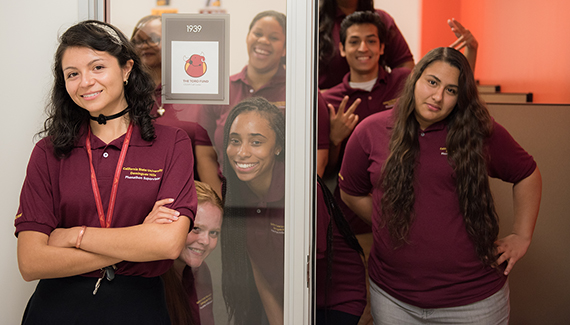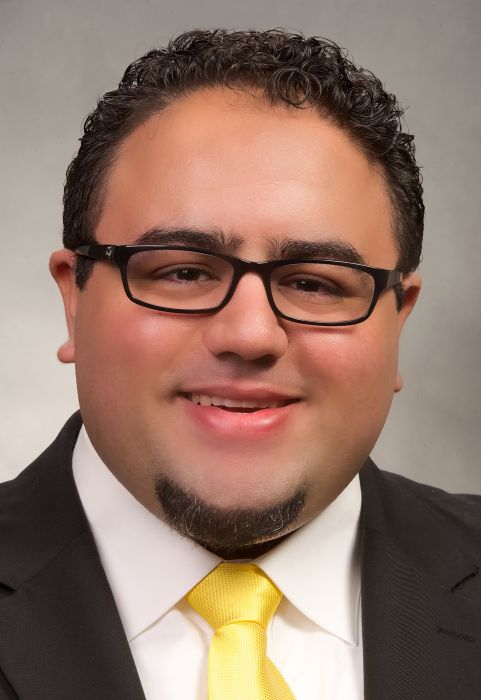
After only six months on the job, the students placing calls in the Toro Fund Call Center at California State University, Dominguez Hills (CSUDH) are not only learning new skills and earning some cash, they are also reaching out to alumni eager to better connect with campus and a new generation of Toros.
The Toro Fund Call Center is a comprehensive annual giving program developed and managed by CSUDH’s Division of University Advancement (UA) and staffed by student “phonathon ambassadors.” The center reaches out to CSUDH’s approximately 90,000 alumni to seek donations to create student scholarships and fund such projects as campus improvements and faculty research. Since the center opened in November 2015, the students have already raised approximately $94,000 of their goal to raise $150,000 by June 2016.

Along with fundraising, the students parlay their genuine interest in the alumni’s experience on campus and in the workforce to catch up with those who are or have been active contributors to the university’s success in the past, as well as create relationships with those who may not be familiar with the variety of ways they may support their alma mater. The alumni have responded in kind, curiously asking the students about campus life today and what is on the horizon for CSUDH.
That’s why we call our students ‘phonathon ambassadors.’ Their role is not only to ask our alumni for contributions for our scholarship programs, colleges, and departments, but also act as a direct extension of the university,” said Andre Khachaturians, senior director of annual giving and advancement services. “The students have been very eager to be part of the experience, particularly in reaching out to alumni who have never returned to campus, as well as newer alumni who may still be looking for the right job. These interactions have been enjoyable on both ends of the line.”
Hillary Griffin, the call center’s coordinator who manages its 16 student callers–14 additional students are expected to be hired in the coming year–said it’s important to make the alumni feel a part of the campus. Before the students start making calls each day they are provided updates about upcoming alumni-exclusive events to share, and events opened to the general public.
“We want the alumni to feel really connected to the school,” said Griffin. “Many of the alumni who we call graduated as far back as the 1960s, and for some there has been a good amount of time since they were on campus, so we want them to know that ‘Once a Toro, always a Toro.’”
Some of the perks that come with being a student ambassador in the call center are flexible schedules, an on-campus job, good pay, life skill development, and more comprehensive resumes.
“Students learn life skills that they can transfer to any profession of their choosing,” said Khachaturians. “They learn negotiation, public relations, how to speak in public and think on their feet, and how to take objection and act professionally in all situations. They also learn how to speak with people from all backgrounds and experiences.”
Student success is at the core of UA’s mission, and the call center is no exception. Both the ambassadors and generations of CSUDH students will benefit from the increase in alumni support it generates. The call center was also supported by students serving on the CSUDH budget committee because it creates a number of jobs on campus for students, which was a top priority for the center to be approved for Student Success Fee funding.
“One thing we heard during budget deliberations was that we need more student employment opportunities on campus, and the call center provides a great way to help our students both earn money and give back to their campus,” said Khachaturians. “We hire students to make phone calls to alumni and friends of the university to ask for donations for scholarships, campus construction and improvements, faculty research and development–all of which will benefit students for years to come. But it’s the jobs we’ve created in the center that are having a direct and immediate impact on students’ academic and personal lives.”
Khachaturians looks forward to the growth of the call center and the continued success of its students. He has worked at other colleges and universities in the past, but has found the phonathon ambassadors to be “some of the most impressive” students he has worked with.
“Making phone calls to strangers is not easy. It takes guts. In fact, for most of our students this is their first job,” he said. “All of our students have taken on their roles with passion, compassion, and a drive that I haven’t seen in a long time. They are not only eager to help each other as classmates and fellow ambassadors, but they truly want to help the university get to the next level.”